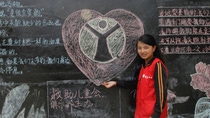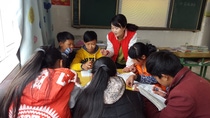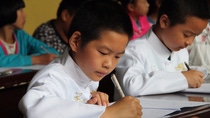Post-quake psychosocial recovery and basic education quality improvement
The long-term success of a corporate is related to the impact-orientated social activities. Together with partners, BASF has been actively assuming its social responsibilities through donation, not-for-profit activities, as well as supporting starting ventures. The societal projects cover from education and empowerment, housing, health and nutrition, disaster relief and disaster risk reduction to water and sanitation. In doing so, BASF is not only helping those people in need, but also contributing to solving current and future social challenges.
In 2016, a three-year education support program for Sichuan province was successfully concluded. This is the continuation of the 2013 Sichuan Ya’an earthquake reconstruction project carried out by BASF and BASF Stiftung (a charitable foundation based in Germany). Prior to this, the two sides have funded UN-Habitat to complete a repair and maintenance projects for the schools in disaster-hit areas.
"China is an area with a high incidence of natural disasters. It is important to raise children's safety awareness and self-protection abilities," said Ulrike Wilson, Specialist, International Development Projects of BASF Stiftung. The support program included a one-year post-quake campus psychosocial support project and a two-year basic education quality improvement project, which is implemented by the global child development organization – Save the Children. After three years, it has brought positive impacts on the long-term improvement of the local children's educational environment.
Zhang Muyao, Senior Project Officer of Save the Children, was in charge of the implementation and coordination of the program. As introduced by her, in the event of a disaster, it is essential to conduct psychological first aid for the affected people, which is often highly concerned. However, post-disaster psychological support is a long-term and systematic work. During the 1 to 2 years after a disaster takes place, the rescue forces are evacuated successively, but there is still a demand in psychological support in the area. According to the feedback from the Ya’an Municipal Education Bureau, as well as the teachers and students there, local schools still needed much continuous help in disaster risk reduction as well as psychosocial support. In November 2013, Save the Children decided to carry out the Phase I Project of Psychosocial Support and Disaster Risk Reduction for Elementary Schools, mainly to help the teachers of the 23 project schools in Ya’an to improve the ability in post-quake psychosocial support for over 20,000 children, thereby enhancing their disasters coping abilities. Meanwhile, the project also provided systematic training for teachers in disaster risk reduction, so that they can carry out activities in schools to help students better understand, develop and implement disaster reduction plans.
The training is mainly carried out through participatory training, lecture, discussion and presentation, aiming to equip the trainees with independent and practical abilities to set up psychological classes and organize disaster prevention drills, while ensuring that they master the relevant theories.
The project helps the schools to greatly improve their psychological support ability. On one hand, the psychological intervention has helped children to restore their basic life. On the other hand, a long-term psychological support mechanism has begun to form.

“After the training, the psychology teachers carried out regular psychological activities in the schools, and gradually applies the psychological support equipment such as psychological counseling rooms. Meanwhile, they could also deliver trainings on psychological health education to other teachers in the schools. In this way, the influence of the project is expanded, and the psychological education of Ya’an is able to continue in a longer period of time,” said Liu Linhui, Psychological Education Researcher of Ya'an Educational Science Institute, who is responsible for carrying out related psychological trainings in the region, “A lot of teachers have become interested in psychology, and even considered psychological support as a long-term development direction. A teacher from Baoxing County, because of the increased interest, has obtained the National Secondary Psychological Counselor Certificate.”
"The greatest achievement of the project is to develop psychosocial support into a regular course and integrate it into daily teaching activities,” said Zhang, "When the students are having psychological stress in their daily life, the teachers can also offer support.”
In addition to helping children improve their ability to cope with disasters, BASF and BASF Stiftung care especially about their future. The southwest of Sichuan, where Ya’an is located, has been facing the issue of uneven educational resources, relatively backward education level and lack of qualified teachers. In order to further enhance the competitiveness of the children in the disaster area, in November 2014, the second phase of project Improving the Quality of Basic Education was officially launched.
Save the Children selected four town-level nine-year compulsory education schools in the three prefecture-level cities – Xichang, Ya'an and Meishan of Sichuan Province. The project aims to help teachers to form a student-centered teaching philosophy and to learn related methods by teaching facilities and equipment upgrade, teacher trainings and supervision, exchanges between schools, among others, thus improving the quality of edcuation and providing more development opportunities for students.

Yang Liang is a teacher of the project school Xichang Lojishan School. After graduating from college in 2012, she came to school to teach Chinese for junior high students. Since she is also the class tutor, some small disputes between her and the students occur from time to time. "I would like to learn how to get along with students, enhance mutual understanding, while improving my teaching capability," said Yang.
A major focus of the training is the participatory teaching methodologies. It is to center on students, encourage students to actively participate in the learning process and to take initiative to raise questions and acquire knowledge.
The traditional lecturing way is often dominated by teachers and the atmosphere is relatively depressing. By introducing participatory methods such as group discussion, sitcom, games and so on to the classroom, the atmosphere becomes more relaxing and the students are more self-motivated. Yang found out that grouping the students of different personalities and learning performances into a team to complete learning tasks together, is also helpful to improve students' learning ability and social skills. "The introverted students, in the relaxing atmosphere and through discussion with their peers, become more cheerful and bold to speak aloud," said Yang, "Once there was a student who hated writing compositions. After regular class discussions, his view of writing was changed. He no longer considers it as a homework, but as a way to share interesting stories with his classmates. Hence, his writing ability improved. From being unable to write anything at first, he can now write compositions of 300 words or even more.”
The idea of participatory teaching brings not only new teaching skills, but also new education philosophy. During the training, the project team invited lecturers who had been teachers before, and their abundant teaching experience has inspired a lot. In the past, once the students “made troubles”, Yang would criticize them or even asked their parents to come to the school. On the contrary, the project advocates considering from the perspective of students and thinking about the reasons behind students’ behaviors, which makes Yang begin to rethink the relationship between her and students. Therefore, she abandoned the former practices, beginning to listen to the students, protect their self-esteem, and change criticizing to encouraging. She gradually discovers that the distance between her and students is closer, and the teacher-student relationship changes from tension to intimacy.

The project hopes that the advanced teaching methods could be practiced there for a long term even after the training. In the later period, the focus of the training of trainers, which means they are to pass on the teaching ideas and methods to other teachers. Now, Yang is actively promoting advanced teaching methods and helping teachers to enhance teaching abilities in her school through open classes, teaching and research activities and other forms.
"Education is closely connected to the future of children and plays an important role in social development," Ulrike Wilson said, "Teachers’ education philosophy will have long-term impacts on their teaching behaviors. We will continue to support the promotion of advanced teaching ideas, improve children’s educational environment, and create a better tomorrow for them.”
Photos: Save the Children